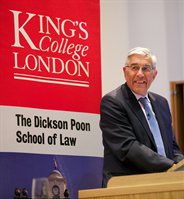Business and the Rule of Law
 Dickson Poon School of Law Distinguished Fellow and Visiting Professor, Lord Phillips of Worth Matravers, recently received the honour of being invited to join the United Nations Global Compact Business for the Rule of Law Project Steering Group.
Dickson Poon School of Law Distinguished Fellow and Visiting Professor, Lord Phillips of Worth Matravers, recently received the honour of being invited to join the United Nations Global Compact Business for the Rule of Law Project Steering Group.
In September 2013, the UN Secretary-General launched a global movement entitled ‘Business for the Rule of Law’. This is an exciting and innovative initiative to engage the global business community in mobilising support for the rule of law.
The Business for the Rule of Law Steering Group, which Lord Phillips has agreed to join, has been assembled to develop, in consultation with the UN Secretary-General’s Rule of Law Unit and the UN Global Compact, a Framework which will complement and reinforce UN goals, in particular the Post-2015 Agenda, within the global business community. The Steering Group comprises members with varied and complementary expertise, and a strong track record of supporting and strengthening the rule of law, from business, the legal profession, academia and civil society, including Mr William Neukom, Founder and Chief Executive Officer of the World Justice Forum, and Mr David W. Rivkin, Vice President of the International Bar Association.
The Framework will provide guidance and promote dialogue on how companies can support the rule of law in the regions in which they operate– particularly where the rule of law is not well established. The Framework will include suggested action for business, practical examples of such action, and an interactive technology hub to promote the ways in which companies from diverse regions and sectors are taking action to actively support the rule of law in their business operations and relationships as a complement to, rather than as a substitution for,government action. By way of example,business may support the rule of law through core business activities, strategic social investment and philanthropy, public policy engagement and advocacy,and/or partnerships and collective action.
You can read more about the UN Global Compact and its Ten Guiding Principles here.